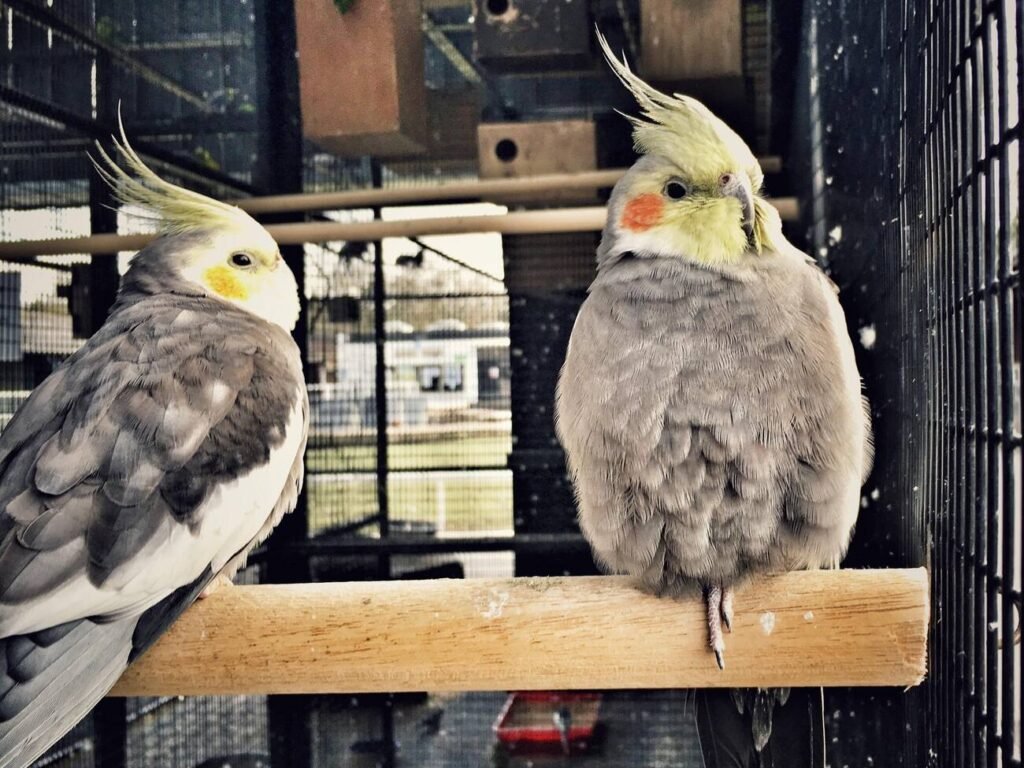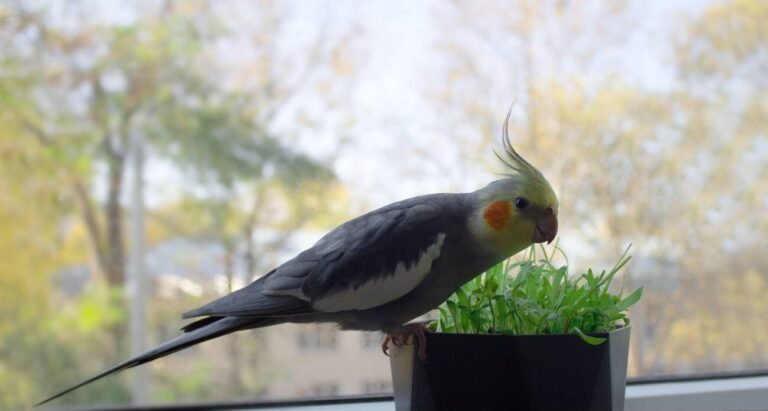Do Cockatiels need a Mate to be Happy

As someone who has worked with cockatiels for many years, I can confidently say that these birds are my favorite. Their charming behaviors, sweet sounds, and affectionate nature make them stand out among other pet birds. Cockatiels are incredibly social creatures, and I’ve often observed in my own farm that they thrive in the presence of a partner. If you want to ensure your cockatiel’s happiness, providing them with a companion is essential.
But do cockatiels truly need a mate to be happy and fulfilled? This is a common question among cockatiel owners. In this article, we’ll explore the dynamics of cockatiel companionship, factors that influence their social needs, and provide guidance to ensure their overall well-being.
The Importance of Companionship for Cockatiels
Cockatiels are part of the parrot family, which is known for its social and interactive nature. In the wild, cockatiels live in flocks, where they form bonds, interact, and engage in a variety of social behaviors that are essential for their well-being. These birds are not solitary creatures; they thrive on companionship, which plays a crucial role in their mental and emotional health.
Why Companionship Matters for Cockatiels
In their natural habitat, cockatiels rely on their flock for protection, social interaction, and finding food. Being part of a group gives them a sense of security, as they can communicate with each other through calls, preening, and playing. Without companionship, cockatiels can become stressed, anxious, or even depressed, which may lead to health problems such as feather plucking or loss of appetite.
As pets, cockatiels may not have a large flock around them, but they still crave interaction—whether with other birds or their human caregivers. While some cockatiels may bond closely with their human companions, others may show signs of loneliness and benefit greatly from having a companion bird.
Factors Influencing Cockatiel Happiness
While it’s clear that cockatiels are social by nature, not every cockatiel has the same needs. Factors such as temperament, socialization, and the level of attention they receive from their human caregivers all play a role in determining whether your cockatiel needs a mate or if they can be content with human interaction alone.
Individual Temperament
Just like people, cockatiels have individual personalities. Some birds are more independent and may be content with their human family members providing them with attention. Others are more social and will thrive with another bird to keep them company. Cockatiels that enjoy constant interaction may feel lonely if left alone for long periods of time.
Socialization from a Young Age
Cockatiels that have been hand-reared and socialized with humans from a young age may not necessarily need a mate, as they often form strong bonds with their human caregivers. However, cockatiels that were raised in an aviary or among other birds may have a stronger desire for avian companionship, making it essential to provide them with a mate.
Human Interaction
Some cockatiels can form deep, meaningful bonds with their human owners. They may enjoy spending time on your shoulder, mimicking your words, or preening your hair. If you are able to spend significant time each day interacting with your cockatiel, providing toys, and keeping them mentally stimulated, they may not feel the need for a mate.
However, if your lifestyle doesn’t allow for constant interaction with your bird, introducing a mate or companion bird might be a better option for their happiness and well-being.
Understanding Cockatiel Behavior: Signs of Loneliness
Cockatiels communicate their emotional and physical state through behavior. If your cockatiel is lonely or unhappy, they will show signs that something isn’t right. Here are some key behaviors to watch for:
Excessive Vocalization
Cockatiels are known for their sweet chirps and whistles, but if your bird is calling out constantly, it may be a sign that they are seeking attention or feeling lonely. Excessive or loud vocalization can be a cry for companionship, especially if they are left alone for long periods of time.
Feather Plucking
Feather plucking is a sign of distress and can occur when a cockatiel is bored, lonely, or stressed. In extreme cases, this behavior can lead to serious skin infections and health issues. If your cockatiel begins plucking their feathers, it’s important to address the underlying cause, which may be a lack of social interaction.
Aggression or Withdrawal
A normally sweet cockatiel that suddenly becomes aggressive or withdrawn may be experiencing loneliness or frustration. They may become defensive of their space or refuse to engage in their usual playful behavior. Providing them with more social interaction or considering a companion bird can help alleviate this behavior.
Lack of Appetite or Depression
Cockatiels are active birds that enjoy exploring and interacting with their environment. If your bird appears lethargic, disinterested in food, or shows signs of depression, it could be due to a lack of social stimulation. Introducing a companion or providing more environmental enrichment may help improve their mood and overall well-being.
Providing for Cockatiel Well-Being: Keeping a Single Bird Happy
If you decide to keep a single cockatiel, it’s important to provide them with ample social interaction, mental stimulation, and environmental enrichment to prevent loneliness. Here are some key ways to keep your solo cockatiel happy:
Spend Quality Time with Your Bird
Cockatiels love being around their owners. Make sure to dedicate time each day to interact with your cockatiel. This can include talking to them, playing with toys, or allowing them to sit on your shoulder while you go about your daily routine. Consistent interaction helps strengthen your bond and prevents loneliness.
Provide Toys and Activities for Mental Stimulation
Cockatiels are curious and intelligent birds that need mental stimulation to stay happy. Make sure to provide them with a variety of toys, such as foraging toys, bells, mirrors, and puzzles. Rotating toys regularly will keep them engaged and prevent boredom.
Create a Stimulating Environment
Your cockatiel’s cage or aviary should be an enriching environment that mimics their natural habitat. Include perches of varying sizes, swings, and plenty of space for them to move around. A cage located in a high-traffic area of your home can also help them feel more included in daily activities.
Introducing a Companion Bird: Tips for a Smooth Transition
If you’ve decided to introduce a mate or companion bird to your cockatiel, it’s important to approach the introduction carefully to ensure a smooth transition. Here are some key tips to follow:
Choose the Right Companion
Not all cockatiels will get along, so it’s important to choose a companion bird that has a similar temperament to your existing cockatiel. Birds that are too aggressive or too timid may struggle to form a bond. Consider factors such as age, gender, and socialization when selecting a companion.
Introduce Birds Gradually
Allow your cockatiel to adjust to the presence of the new bird gradually. Start by placing the two birds in separate cages side by side so they can see and communicate with each other without physical contact. Monitor their behavior to ensure there are no signs of aggression or distress.
Allow Supervised Interaction
Once both birds appear comfortable with each other’s presence, allow them to interact in a neutral space under supervision. Watch for positive signs such as mutual preening, shared eating, and relaxed body language. If the birds show signs of aggression, separate them and try again later.
Monitor the Bonding Process
Bonding between cockatiels can take time. Some birds may form a strong bond quickly, while others may take weeks or even months. Be patient and provide both birds with individual attention to ensure they feel secure and comfortable.
Conclusion: Ensuring Cockatiel Happiness through Companionship
Cockatiels are social, intelligent birds that thrive on companionship. Whether your cockatiel needs a mate to be happy depends on several factors, including temperament, socialization, and the level of interaction they receive from you as their caregiver.
Providing ample social interaction, mental stimulation, and environmental enrichment is crucial for the well-being of single cockatiels. However, if your bird shows signs of loneliness or distress, introducing a companion bird may be the key to ensuring their happiness and fulfillment.
By understanding the dynamics of cockatiel companionship and taking steps to meet their social and emotional needs, you can create a loving, enriching environment for your feathered friend, ensuring many years of happiness and companionship.



